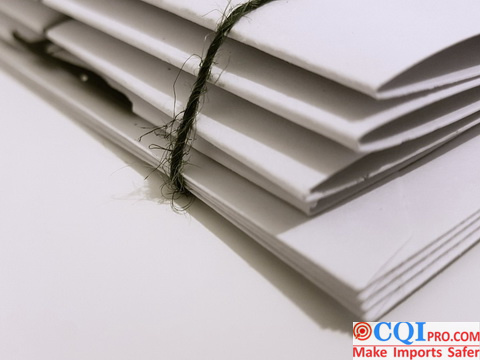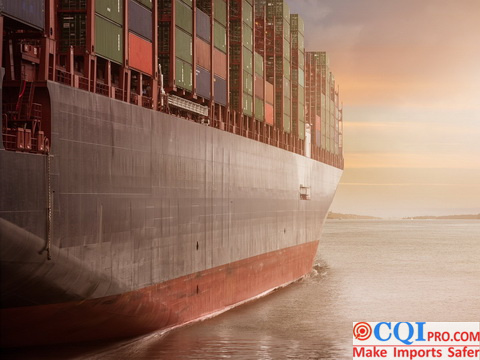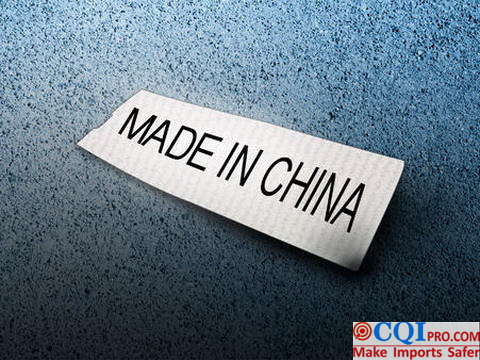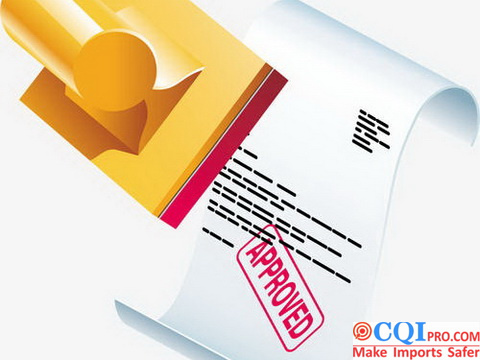Inspection Certificate,Import Protected By Law
In international trade, the Inspection certificate is a technical document for multinational importers and exporters to perform procurement business contracts and important commodity quality guarantee clauses. Inspection certificate is one of the important contract basis clauses for importers to ensure that exporters meet the corresponding product standards according to the importer’s commodity procurement technical requirements in order to protect their own commercial interests in the complex transnational procurement process.
With the rapid development of global international trade for several decades, China has become a big manufacturing country, and “MADE IN CHINA” has been widely welcomed in the world, mainly because it has the characteristics of good quality, low price and strong practicality. China’s industrial manufacturing has the most complete industrial chain in the world. In the field of consumer goods, it almost covers the needs of all importers in the world. Whether it is the high-end market of developed countries with high quality and high price, the market of developing countries pursuing cost performance, or even the market of the least developed countries with low price, “MADE In China” products are popular. It is really amazing that importers from all over the world can find Chinese suppliers suitable for their own markets in China. No other reason, it is mainly because the breadth and depth of China’s industrial chain is difficult to reach for other countries. For the same kind of products, Chinese manufacturers can be divided into high-end, medium-end or low-end products according to the characteristics of regional industrial chain. International importers purchase related products in corresponding places of origin according to their own product quality requirements. In the procurement contract, importers agree with exporters that the quality of purchased products meets the agreed quality standards, and the designated third-party inspection company will conduct product quality inspection. And provide an inspection certificate according to the inspection results, so that buyers can protect their own commercial interests. In short, an inspection certificate provided by a reliable third-party inspection company is very important for importers.

Definition of Various Inspection Certificate
Inspection certificate generally refers to the certificate issued after the commodities, vehicles, ships, etc. have passed the inspection by relevant competent departments. For example, the certificate issued by the State Administration of Commodity Inspection after the export commodities pass the inspection, and the ship inspection certificate issued by the Ship Inspection Bureau are all called “inspection certificates”. The insurer can only consider underwriting the goods, vehicles and ships with inspection certificates.
It is a valid certificate of export goods delivery settlement and import goods settlement claims; The certificate of legal inspection of commodities is the legal certificate of declaration, export and import of commodities. The release form issued by the commodity inspection authorities and the release stamp stamped on the customs declaration form have the same customs clearance effect as the commodity inspection certificate; The inspection notice issued is of the nature of commodity inspection certificate.
It is a document that proves the weight of import and export commodities.
It is a document that proves the quantity of import and export commodities.
It is a certificate that proves that the exported animal products or foods have passed the quarantine inspection. Applicable to frozen livestock meat, frozen poultry, canned livestock, frozen rabbits, casings and other export commodities. It is an important document for external delivery, bank settlement and customs clearance in importing countries.
It is a certificate that proves that the exported animal products and foods that can be eaten by human beings have passed the sanitary inspection or quarantine. Applicable to casing, canned food, frozen fish, eggs, dairy products, honey, etc. It is a valid certificate for external delivery, bank settlement and customs clearance.
It is a certificate that proves that the exported animal products have been disinfected to ensure safety and hygiene. Applicable to bristle, horsetail, feather, human hair and other commodities, it is a valid certificate for external delivery, bank settlement and foreign customs clearance.
It is a certificate used to prove that exported grains, oilseeds, skins and other commodities, as well as packing wood and plant fillers, have been fumigated and exterminated.
It is a certificate to prove the damage of imported goods. Applicable to the situation of defective, short and destroyed imported goods; It can be used as a valid certificate for the consignee to claim compensation from the shipper, carrier or insurer, etc.
If the contract stipulates that the certificate of origin shall be issued, the exporter shall issue the certificate of origin and the commodity inspection authorities shall issue the certificate of origin as required by the preference-giving country.
A document that proves that the value of the product or the value of the commodity contained in the invoice is correct.
It is to prove that the ship and container loading department correctly stowage goods, as a certificate to prove the performance of the obligations of the contract of carriage. It can be used for handling disputes when goods are handed over or damaged.
It proves the condition, degree and cause of damage of goods, and is a document for claim and settlement.
It is an important basis for foreign trade relations and judicial, arbitration, capital verification and other relevant departments claim, compensation, evaluation or judgment.
It proves whether the cleanliness, refrigeration efficiency and other technical conditions of the cabin carrying export commodities meet the requirements of protecting the integrity and safety of the quality and quantity of the goods carried. It can be used as the basis for the carrier to fulfill its obligations under the charter party, and for foreign trade parties to hand over goods and deal with cargo damage accidents.
It is a special certificate for exporting raw silk. Its function is equivalent to quality inspection certificate and weight/quantity inspection certificate.
It shall be used as certificates to prove the carrier’s performance of contractual obligations, clarify the liability limits and facilitate the handling of cargo damage and cargo difference liability accidents.
It is a certificate that proves the weight, volume and tonnage of import and export commodities. It can be used as the basis for calculating freight and formulating stowage plan.
It can be used as certificates for both parties to define the performance responsibility and settle the handling expenses.
Inspection Certificate In International Trade
According to different situations, different certificates , appraisal certificates or other certificates are issued according to different inspection results or appraisal items, which are collectively referred to as certificates of Inspection. Inspection certificate plays a fair role in international trade. It is the main basis for buyers and sellers to hand over goods, settle payment for goods, handle claims and settle claims, and it is also an valid certificate for customs clearance, tax payment and freight settlement.
Inspection certificate is related to the economic responsibilities and rights and interests of all parties concerned, and its functions are as follows:
- As the basis for whether the quality, weight, quantity, packaging and sanitary conditions of the goods delivered by the seller conform to the provisions of the contract.
- As the proof of the buyer's objection to quality, quantity, weight, packaging, etc., rejection of goods and claim for compensation.
- As one of the documents for the seller to negotiate payment with the bank. If the results listed in the inspection certificate are inconsistent with the provisions of the contract or letter of credit, the bank has the right to refuse to negotiate the payment.
- As a valid certificate for customs clearance of exporting and importing countries. All commodities within the scope of statutory inspection must provide the customs with the inspection certificate issued by the commodity inspection authorities. Otherwise, the customs will not release it.
- As the basis for proving the actual situation of goods during loading, unloading and transportation and clarifying the attribution of responsibilities.
Therefore, in international trade, the quality, specifications, hygiene, safety, quarantine, packaging, quantity, weight, damage, shipment conditions and shipment technology of imported and exported commodities are inspected, appraised and supervised by the inspection institutions set up by the state or the independent appraisal institutions registered by the government. Import and export commodity inspection is an indispensable link in the process of goods handover. After passing the inspection, an inspection certificate will be issued, and the exporter can declare for shipment; If the inspection is unqualified, you can apply for a re-inspection. If the re-inspection is still unqualified, the goods can not be exported.
How to obtain inspection certificates for export commodities?
Regarding the inspection of export commodities, the procedures are as follows:
- The inspection company accepts the application of inspection. First of all, the applicant fills in the “Application for Export Inspection” and provides relevant documents and materials, such as foreign trade order contract, packing list and product requirements;
- Sampling. The inspection company will arrange inspectors to take samples randomly according to different characteristic of goods. The factory should cooperate with inspectors to perform sampling.
- Inspection. Inspectors can use various methods, from sensory to instrumental analysis, or sampling to laboratory for physical and chemical tests, to inspect export commodities.
- Issue inspection report or certificate. General export commodity inspection certificates are divided into two categories. The first category is the inspection certificate issued by the State Administration for Commodity Inspection of China; The second category is the inspection certificate issued by the third-party inspection company.

At present, most export commodities can be inspected by a third-party inspection company designated by the importer, except that the commodities specified in the Chinese legal inspection catalogue must be inspected by the China Commodity Inspection Bureau.
Is it necessary to find a third-party inspection company to issue an inspection certificate?
Often, some Chinese factories think that it is unnecessary to find a third-party inspection company to conduct the inspection, the factory can provide an inspection report or a product quality report to their clients directly. In fact, this idea is very wrong, because the inspection report or inspection certificate issued by the third party is of great significance. Why?
First of all, the third party inspection means commodity conformity inspection and approval activities carried out by an independent third party(such as a full-time supervision and inspection institution) outside the interests of buying and selling, as a fair and authoritative non-party according to relevant laws, standards and contracts and other parties recognized by both parties. The reason for choosing the third-party structure is to get a fair and objective inspection report.
Secondly,under the condition of globalization,the Chinese industrial production capacity is globally allocated.Generally speaking, the spare parts come from all over the country or even from all over the world.Which parts is “price-performance ratio”,the factory will purchase it. So the inspection report provided by the factory itself will only have a better understanding of the parts produced by itself, and it is better for the third-party inspection company to inspect the whole product in all aspects.
Finally,it is very important for importers to prove the reputation and product quality of enterprises to consumers.Only through the inspection certificate of a third party, the consumers will have confidence in this good. In this way, on the one hand, it can convince consumers, on the other hand, it can effectively prove the reputation of enterprises.

It is precisely because the inspection certificate issued by these third-party companies are of great help to the development of enterprises, so in this case, we should try our best to find some trustworthy third-party inspection companies. Then how to find a reliable third-party inspection company can read another article on this site: How to find a reliable third-party inspection company?
Since importers are aware of the importance of the third-party inspection certificate, it is very important to have a deep understanding of how inspection companies inspect products before providing inspection certificates to importers.
What are the main contents of the third-party inspection?
- Product appearance inspection
- Product size: whether the product size meets the requirements of the order and the difference is within the tolerance range
- Color of the product: whether the color of the product meets the requirements of the order, or is it consistent with the sample
- Structure of products: whether the product structure meets the order requirements and meets the basic needs

- Quantity and weight inspection
Whether the shipped quantity is consistent with the packing list, whether the gross weight of the outer box is not more than 5%-10% different from that on the outer box, and whether the net weight of the product meets the requirements of the order.
- Packaging inspection
Packaging inspection first checks whether the commodity packaging marks (marks, numbers, etc.) on the outer packaging are consistent with the import and export trade contract. For packaging inspection of export commodities, besides the packaging materials and methods must comply with foreign trade contracts and standards, it should also check whether the internal and external packaging of commodities is firm, complete, dry and clean, and whether it is suitable for long-distance transportation and the customary requirements of protecting the quality and quantity of commodities. The commodity inspection authorities generally sample or inspect the packaging of import and export commodities on the spot, or carry out weighing and weighing at the same time.
- Product identification inspection
Product identification refers to the general name of all kinds of marks used to identify product names and their quality, quantity, characteristics and methods of use; In addition to the product instructions, the product identification should be marked on the product or the sales package of the product, the information of the product identification label should be clear and eye-catching, and the graphic symbols should be intuitive and standardized; Graphical symbols should be intuitive and standardized; The characters should be the standard stipulated by the state; The identification label shall have the product name, and the product name shall indicate the true attributes of the product.
- Product Function check
According to the product standards and customer order requirements, check the use functions and parameters of the products, and imitate consumers to experience the products. Generally, it includes basic function test and abuse test. So as to judge whether a product or a batch of products is qualified or unqualified. The purpose is that unqualified raw materials are not put into production, unqualified parts are not transferred to the next process, and unqualified products are not delivered.
After the inspection, the third party will first issue an inspection report showing the detailed contents. If the inspection results meet the quality requirements of the order and standard, the third party can issue an inspection certificate, which is as follow. A valid inspection certificate, which must first contain the company information of the buyer and the seller; Then, the order and the serial number with name of the product; Then mention the inspected sample numbers, as well as the contents and results of inspections. The inspection certificate can be stamped after the buyer and the seller confirm that the description of the order and the product meets the requirements. Send document by email according to customers’ requirements, or send the original documents directly to the designated address.

Above are some specific types and functions of commodity inspection certificates. In actual export business, consumer goods, such as soft lines, hard lines, electronic goods, luxury goods, and bulk commodities, such as steel products, machinery and construction materials, all need inspection certificate. For the exporter, it can prove that the quality, weight, quantity and packaging of delivered goods comply with the relevant provisions of the contract. For the importer, inspection certificate can be used as a relevant certificate for raising objections to quality, weight, packaging and other conditions, rejecting goods and resolving disputes. On the other hand, the importer entrusts a reliable third-party inspection company to issue an inspection certificate, which is also of great help to his own development. Besides helping the importer to control the quality of export commodities, it can also attract the trust of consumers because of his good quality control awareness.
CQI Inspection’s Comments And Summary
This article discusses in detail how to protect the commercial interests of international importers in the process of transnational procurement, introduces the types and functions of common Inspection Certificate, which are convenient for importers to understand, and focuses on the process of how third-party inspection companies provide product quality inspection services, how to get an inspection certificate. The contents and elements of the inspection certificate are introduced to guide importers to understand how a professional inspection certificate can protect the commercial interests of importers. In short, Countless importers have made huge profits from “Made In China” and earned a lot of money. For importers of all sizes, inspection certificate is an important technical basis for them to carry out effective transnational supply chain management. In the process of transnational procurement, the third-party inspection company is the executor of product quality inspection and the provider of inspection certificate. For the third-party inspection company, this is a great responsibility. CQI Inspection company feels the same way.
CQI5 is committed to providing importers worldwide with product quality inspection services that far exceed those of our peers. If you are planning to import or have imported from China or Southeast Asian countries, please contact us cs’@’cqipro.com to learn more about how we can make your imports safer.
This article is an original article for CQI Inspection, who is committed to providing high-quality product inspection technology and know-how sharing for global importers and retailers to make imports safer.
All rights reserved. The contents of this website provided by CQI Inspection may not be reproduced or used without express permission.
For reprint, please contact with CQI Inspection, thank you.





